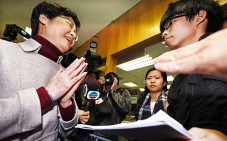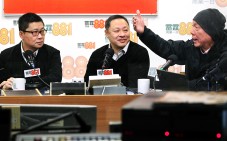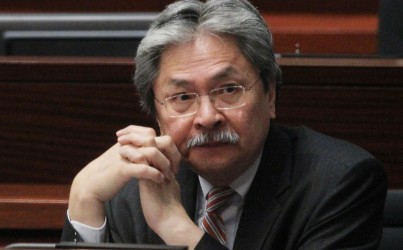Occupy Central
Occupy Central is a civil disobedience movement which began in Hong Kong on September 28, 2014. It calls on thousands of protesters to block roads and paralyse Hong Kong's financial district if the Beijing and Hong Kong governments do not agree to implement universal suffrage for the chief executive election in 2017 and the Legislative Council elections in 2020 according to "international standards." The movement was initiated by Benny Tai Yiu-ting (戴耀廷), an associate professor of law at the University of Hong Kong, in January 2013.
Umbrella Movement
The Umbrella Movement (Chinese: 雨傘運動; pinyin: yǔsǎn yùndòng) is a loose political movement that was created spontaneously during the Hong Kong protests of 2014. Its name derives from the recognition of the umbrella as a symbol of defiance and resistance against the Hong Kong government, and the united grass-roots objection to the decision of the Standing Committee of the National People's Congress (NPCSC) of 31 August.
The movement consists of individuals numbering in the tens of thousands who participated in the protests that began on 28 September 2014, although Scholarism, the Hong Kong Federation of Students, Occupy Central with Love and Peace, groups are principally driving the demands for the rescission of the NPCSC decision.
The movement consists of individuals numbering in the tens of thousands who participated in the protests that began on 28 September 2014, although Scholarism, the Hong Kong Federation of Students, Occupy Central with Love and Peace, groups are principally driving the demands for the rescission of the NPCSC decision.
POST OCCUPY CENTRAL - DAY 25:
Full coverage of the day’s events
Face off: student leader Joshua Wong ambushes Carrie Lam over election reform proposal
Joshua Wong Chi-fung confronted Chief Secretary Carrie Lam in a rare face-to-face encounter this morning, as they passed each other in the corridor of a radio station’s offices.
Dates set for arrest of protest trio, media boss
Police have set dates for the arrests of the three co-founders of the Occupy Central protest movement and pro-democracy media mogul Jimmy Lai Chee-ying.
Budget will offer help for businesses hit by Occupy movement, John Tsang says
Help for businesses hit by the recently concluded Occupy Central democracy movement will feature in Financial Secretary John Tsang Chun-wah's budget speech next month.
Albert Ho to resign after vote on reform
Democratic Party lawmaker Albert Ho Chun-yan said he will resign after he votes against the political reform.
He said the decision made on August 31, 2014 by the standing committee of the National People's Congress left no room for changes in the reform proposal. And he is upset by the fact that realization of true democracy in Hong Kong has gone beyond his anticipation.
Ho hopes his resignation will trigger a by-election that can serve as a de facto referendum over political reform.
Ho won his ''superseat'' as a lawmaker in the District Council function constituency in 2012.
Ho eyes on de facto referendum
A veteran pro-democracy lawmaker pledged Friday to resign from Hong Kong's legislature, triggering a by-election to allow residents to "vent their anger'' at Chinese authorities over proposals on how the city chooses its next leader.
The issue was at the heart of months of mass protests in the former British colony where pro-democracy protesters blocked off stretches of main roads to call for true universal suffrage.
Albert Ho Chun-yan's announcement that he would resign his seat in the city's Legislative Council is the latest show of defiance by Hong Kong's pro-democracy lawmakers, who have vowed to veto any government proposal over how to choose a new leader in 2017.
Though Hong Kong will choose its chief executive through a one-person-one-vote system, the authorities have said candidates must be vetted by a pro-Beijing committee.
Ho's resignation from his "super seat'', one of five in the legislature, will trigger a city-wide by-election in which five million people are eligible to vote.
"I think I should take every possible opportunity to enable the Hong Kong people to vent their anger, their frustrations, and protest against the central government,'' Ho told reporters, announcing his decision.
"I am in a position to do so by resigning from my seat so as to trigger off a territory-wide de-facto referendum,'' he said, adding that he was sure "the Hong Kong people would seize this opportunity to fully express their views.''
Ho said he would resign after pro-democracy lawmakers, who hold a critical legislative veto on constitutional amendments, vote down the political reform package.
Lawmakers are expected to vote on the package in the early months of the summer.
"We will certainly vote down the package, and I have no doubt that it will happen,'' Ho said.
The final framework needs to pass the city's mini-parliament with a two-thirds majority, but Hong Kong's pan-democrats are able to block its passage with their 27 total seats.
Government officials have themselves expressed pessimism over the package's successful passage.
"The political reform is now looking like mission impossible,'' the city's justice minister Rimsky Yuen Kwok-keung told media early Friday, admitting there would be ''difficulty'' in securing the necessary votes.
China has pledged Hong Kong will be able to choose its own leader for the first time in 2017, but it has ruled that candidates will be screened by a loyalist committee -- a proposal that democracy activists have branded as "fake democracy''. -
Student leaders to be sued for contempt of court
The Secretary for Justice has decided to drop charges against 25 Occupy protesters accused of obstructing public officers.
But 22 of them, including student leaders Joshua Wong and Lester Shum, will still be prosecuted for the more serious allegation of contempt of court.
The protesters were arrested in Mongkok in late November when the police cleared the protest site there.
The Department of Justice decided to have them charged with obstructing policemen and bailiffs who were trying to remove barricades.
A bail condition was also imposed, banning them from a large area in Mong Kok.
But Deputy Director of Public Prosecutions, David Leung, said these charges will be dropped when the cases are brought up again in the Kowloon City Magistracy next Wednesday.
But he said the government will continue to sue 22 of them in the High Court for contempt of court.
Leung said they allegedly violated an injunction, and their behavior damaged the administration of justice as well as the court's authority.
The High Court has given the government 56 days to apply to go ahead with the contempt of court proceedings.
Speaking after a hearing on Thursday, Shum from the Federation of Students said he believed the legal process against them was politically motivated.
Meanwhile, the prosecutors said they will not press any charges against nine other people arrested on the same day.
One of them had asked the government for legal costs, saying he had to skip his part time job and could not take an exam in school due to his arrest and the subsequent court appearance.
The judge ordered both sides to file written submissions before he gives his ruling.



沒有留言:
張貼留言